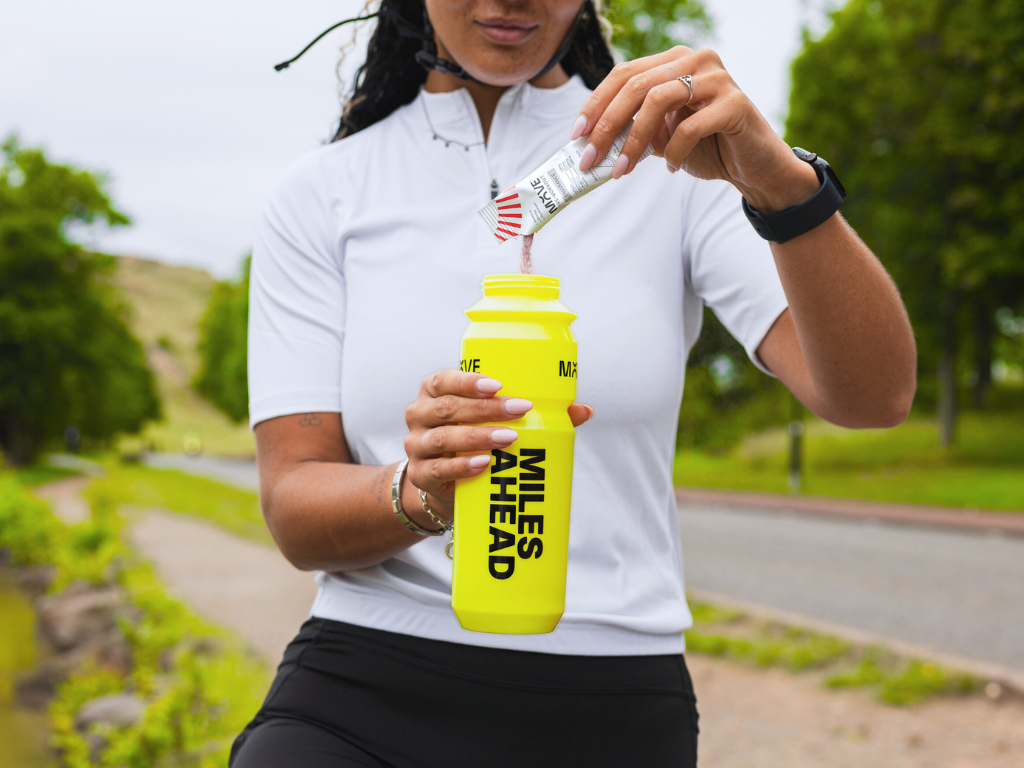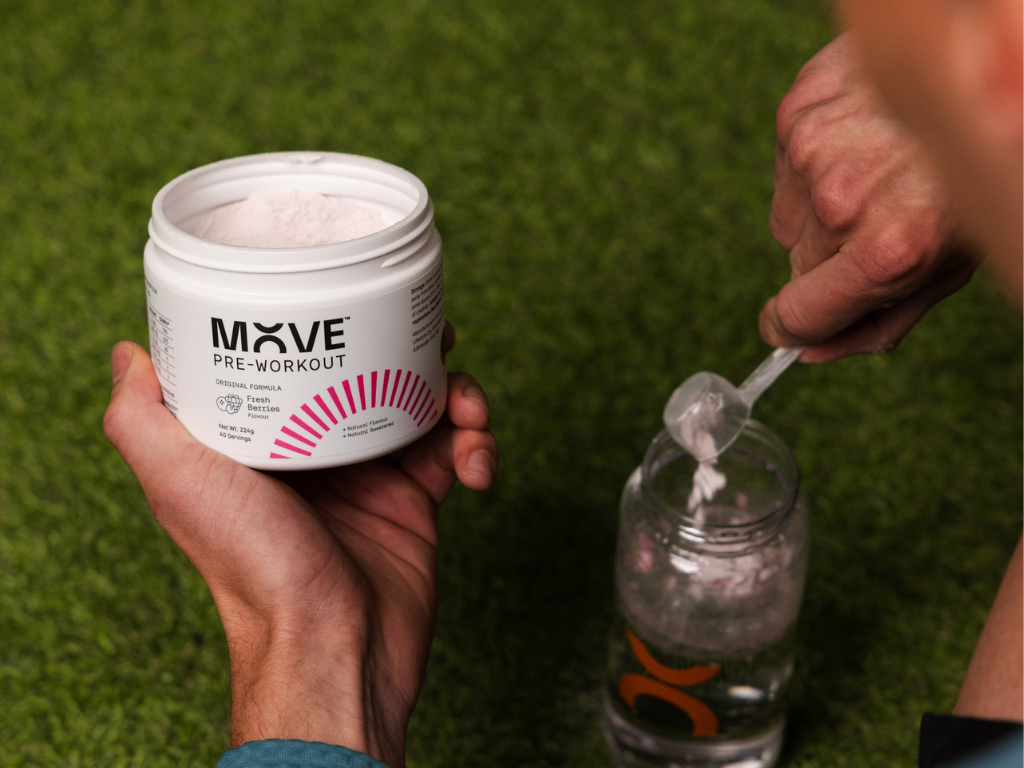
Whether you’re a Hyrox veteran chasing a PB or gearing up for your first event, one thing is clear - energy matters. With the mix of running, sled pushes, rowing, and functional strength tests, Hyrox is one of the most demanding hybrid competitions out there. Getting your nutrition right can be the difference between just finishing and truly performing.
To help athletes fuel smarter, we spoke to performance nutritionist Tom Coughlin - the expert behind MOVE Pre-Workout and the go-to nutritionist for Scottish rugby players, Olympic athletes, and professional boxers.
Here’s his advice on how to structure your nutrition to optimise energy, performance, and recovery for Hyrox.
1. Dial in Your Recovery Ahead of Time
Preparation doesn’t start on race day - it starts in the final days of training.
“After your last big session, the focus should shift to recovery,” says Tom. “That means giving your body the right nutrients to repair and recharge back to 100%.”
Prioritise foods rich in omega-3 fatty acids like salmon, walnuts, and chia seeds to reduce inflammation. Combine that with antioxidant-rich foods like dark chocolate, hazelnuts, and berries to further support muscle recovery and immune health.
2. Fuel Up the Night Before
Don’t leave all your energy prep for race day.
“Having a high-carb meal the night before like pasta with a lean protein source helps top up glycogen stores,” says Tom. “That’s the stored fuel your body will rely on throughout the event.”
This approach also reduces the pressure of race-day fuelling, especially when nerves might make eating a full breakfast more difficult.
3. Your Pre-Race Meal Matters More Than You Think
Tom’s advice? Keep it simple, familiar, and effective.
“You want to go into Hyrox with good glycogen stores, steady energy, and no digestive issues,” he says. “A balanced meal 2–3 hours before the event is ideal - something like oats with banana and a scoop of protein, or chicken and rice if you prefer savoury.”
Avoid heavy fats or too much fibre, which can slow digestion and cause discomfort mid-race.
See Also: What to Eat Before a Run: Pre-Workout Meals & Snacks to Fuel Performance
4. Don’t Wing Your Pre-Workout Strategy
This is where MOVE Pre-Workout comes in. Designed by Tom specifically for athletes tackling high-intensity endurance events like Hyrox, it gives you the physical edge and mental clarity without the downsides of traditional pre-workouts.
“Many pre-workouts are overloaded with stimulants and unnecessary ingredients that cause jitters, bloating, or a crash,” says Tom. “With MOVE, we focused on what works - clinically effective doses of ingredients that support real performance and target the rate limiting factors that would stop hyrox athletes performing at their best..”
The key ingredients in MOVE - including caffeine for energy and alertness, taurine to work synergistically with caffeine to boost physical performance and blackcurrant extract to provide fatigue resistance.
Tom recommends taking MOVE around 30-45 minutes before your event or training session to allow the ingredients to reach peak effectiveness.
5. Hydration and Electrolytes Are Your Silent Advantage
Your sweat rate in Hyrox will be high which means strategic hydration is key. Move endurance is specifically designed with a blend of electrolytes which reflects real-world sweat losses from athletes, not just arbitrary numbers. Using Move Endurance pre-workout before the event will help your body absorb water which is a massive advantage ahead of sweaty exercise.
6. A Final Boost in Energy
You will be burning through carbohydrates during your Hyrox event so pre-exercise carbohydrate intake is essential. Although you will have prepared well and loaded up your glycogen stores by eating well the day before competition, a final simple carbohydrate boost in the hour before competition can support blood sugar levels and get you operating at a high intensity from the off.
You can eat something carb-based like a handful of jelly sweets or a banana but a much more efficient and performance designed fuel in Move’s carbohydrate booster.
Move’s carb booster is made using 100% highly branched cyclic dextrin a pioneering performance carbohydrate. It delivers rapid, sustained energy that keeps you performing at your best, whilst minimising any negative side effects that can come from alternative fuel sources like energy drinks.
7. Keep Things Simple
Having multiple different strategies can make your pre-competition fuelling confusing and can take your mind off your game. To tick all the boxes that are important to optimise pre-exercise nutrition you could be taking handfuls of different products. This is a practical challenge that Move tackles head on.
You can mix your Move Endurance with the carb booster into 500ml of water. And you have a one-drink solution that absolutely crushes your pre-competition nutrition targets. Caffeine, carbohydrate, electrolytes, fluids and more! Using this strategy simplifies your game plan and unlocks the door to elite performance.
8. Pack Smart: Race Day Kit Bag Essentials
Tom recommends prepping your kit bag the night before so you’re not scrambling on race morning. Here's what to include:
- Quick carbs like energy gels, cereal bars, or sweets for a last-minute boost
- Fluids - water, Move Endurance and your carb booster that you consume to thirst when you’re at the event
- Post-race snack or shake with both protein and carbs
9. Don't Forget Recovery
“Post-event recovery is where a lot of athletes slip up,” says Tom. “You’ve just put your body through a huge physical demand - getting in a recovery meal or shake with both protein and carbs within an hour helps rebuild muscle and replenish energy stores.”
Don’t forget about rehydration, either. Replacing lost fluids is just as important as refuelling.
Aim to replenish fluids as soon as possible post-race. Electrolyte solutions, milk, or orange juice are more effective than plain water, helping the body retain fluid and restore electrolyte balance.
Tom recommends replacing 150% of the fluids lost - for example, if you lose 1kg of body weight through sweat, aim to drink around 1.5L of fluid to fully rehydrate and account for urine losses.


